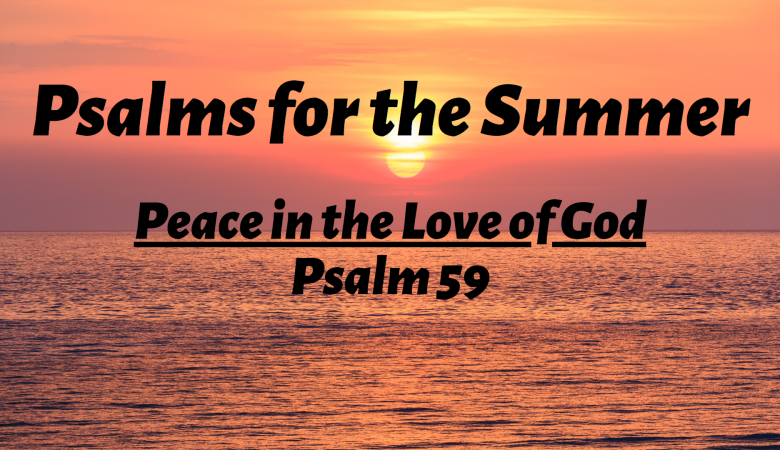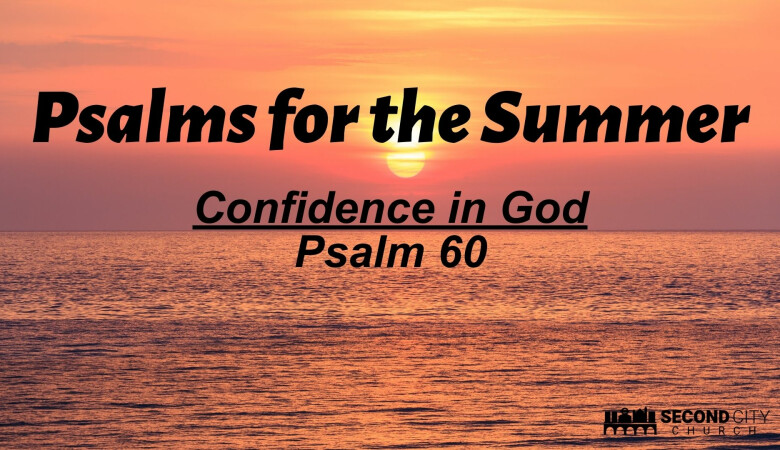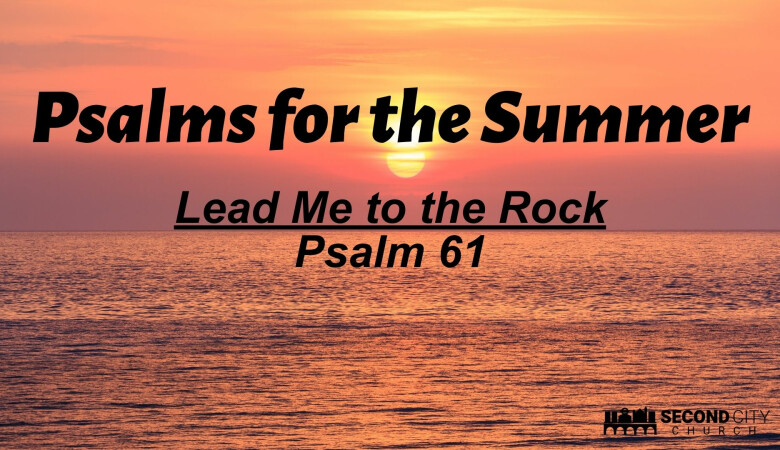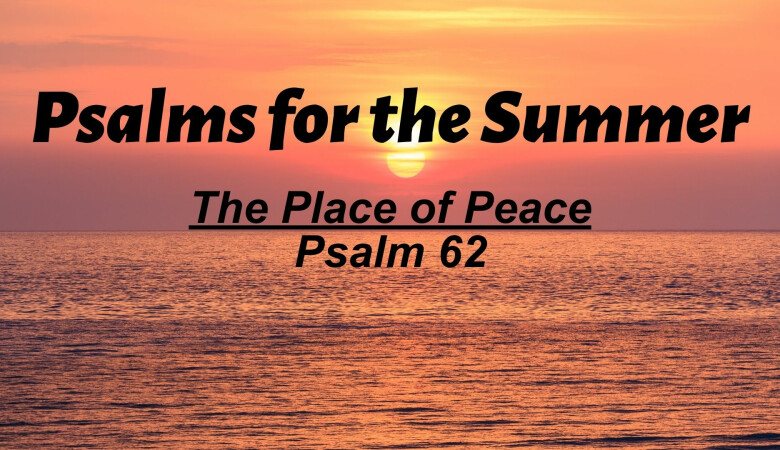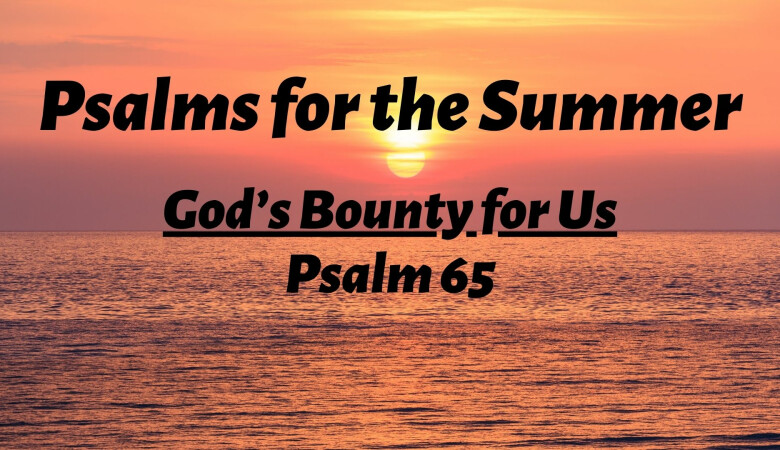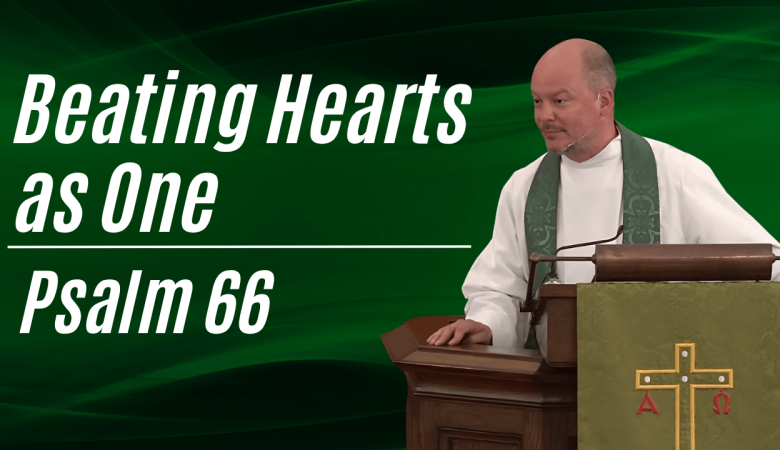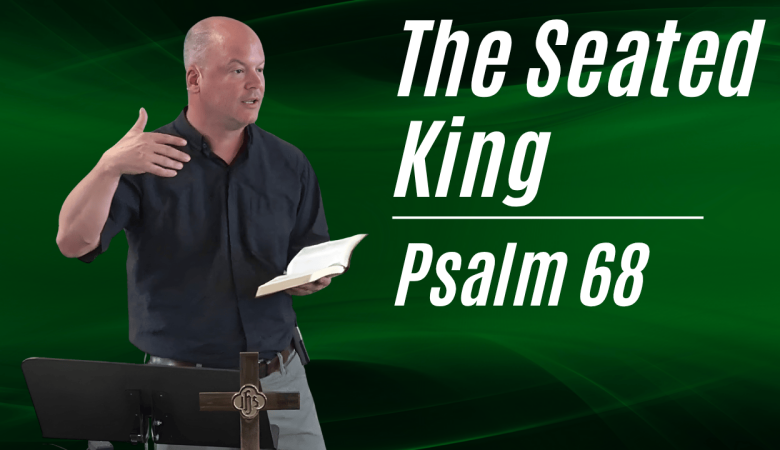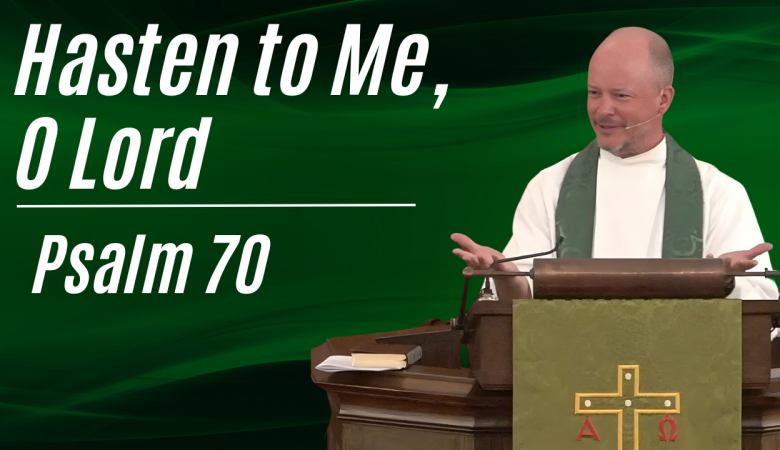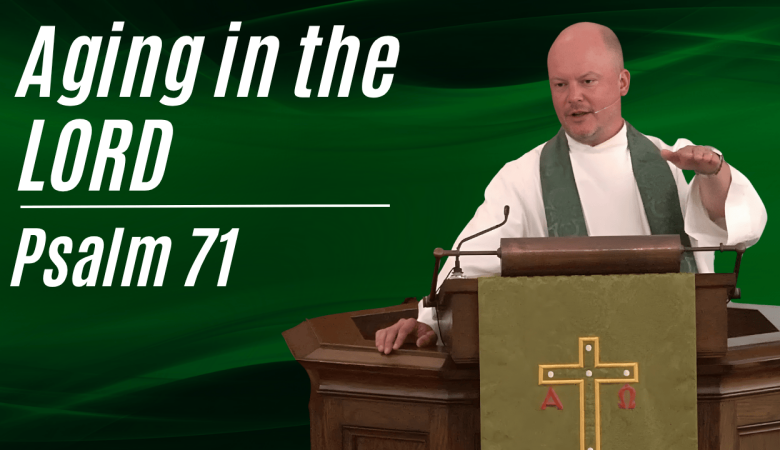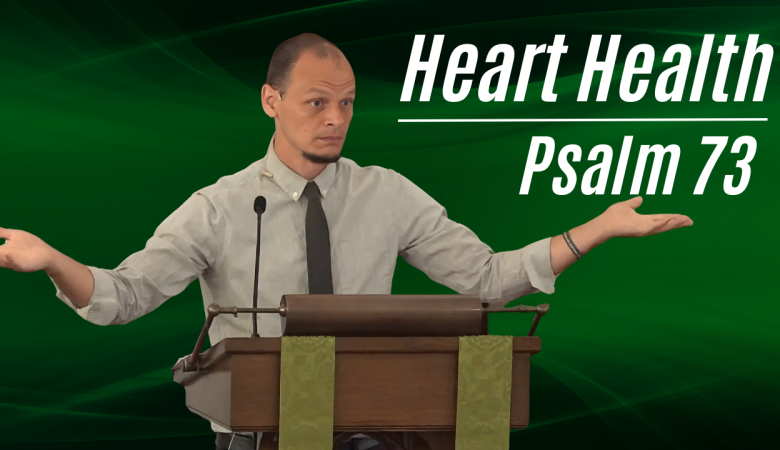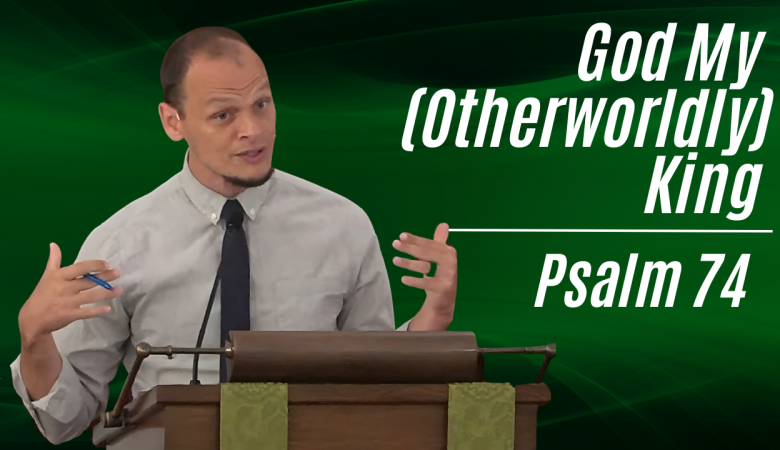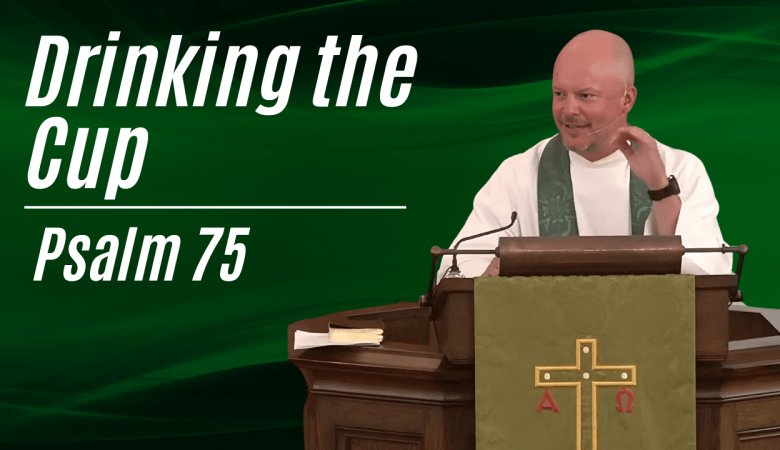Series: Psalms for the Summer
Man of Sorrows
July 13, 2025 | Peter Rowan
Passage: Psalms 69:1-36
Summary
Psalm 69 presents David's raw cry to God in the midst of overwhelming suffering, describing himself as drowning in floodwaters with no foothold. This psalm speaks powerfully to our experience in a broken world filled with natural disasters, betrayal, ridicule, physical suffering, and the weight of our own sinful hearts. David's initial response is understandable—he calls for justice and even destruction upon his enemies. While our desire for justice reflects God's character, Christ teaches us a more excellent way.Remarkably, many verses in Psalm 69 point directly to Jesus, who was hated without cause, consumed with zeal for God's house, and given sour wine on the cross. Christianity doesn't offer a neat intellectual solution to suffering, but rather a God who enters our suffering. The crosses we bear—those places where brokenness hurts us most—are not dismissed by God but intimately known by Him. Christ says, 'I will go to that place. I will know it intimately.' Though suffering awaits us everywhere in this life, we can approach it differently knowing that Christ bears it with us, and that through His resurrection, God promises to make all things new.
Transcript
Opening Prayer
I pray, Lord, for this psalm and for our hearts. No doubt many of us are experiencing, and no doubt nearly all of us at least, have experienced the dynamics of this psalm. Pray, Lord, that in that alone we would find a degree of comfort, that your Word gives voice to the deep experiences of our lives. We gotta pray that today you would speak to us and the love that you have for us in Christ would grow, that we would see just how wondrous the cross is. Pray this in Jesus name. Amen.
Introduction: The Question of Suffering
So I have this question that we're going to kind of address, and I'm going to address it in a roundabout way. And it's a big question that we have in life. It's the question of what do we do with our suffering? What do we do with it? I want to put this a different way. What do we do with the crosses? With our crosses, which is to say, the places where brokenness and sin seem to bring our own suffering, where the effects of living in a world that is full of sin and brokenness actually cause us to have to bear part of their weight. The sin, the effects of sin, our crosses.
The Psalm's Opening: Waters Rising
Right at the very beginning of this psalm, in the very first verse, it says, save me, O God, for the waters have come up to my neck. Verse two tells us, I sink in deep mire where there's no foothold. I've come into deep waters and the floods sweep over me. And my guess is that for all of us, as we're cognizant of the events in our own country over the last 10 days, have a hard time reading those words.
Personal Connection to Recent Tragedy
I will say that this was a text that I read a few weeks ago. And as the floods in Texas happened, I was kind of, in a way, dreading this sermon because it feels too raw and too real. I read yesterday, wanting to just kind of know the current statistics that 170 people are still missing from those floods in Central Texas, that 129have been confirmed dead. Melisse, my wife's own cousin's daughters, were at Camp mystic the week before the flood. Her other cousin's son was going to go to camp right down the road this week. One of our friends who's in our wedding attended one of the other camps and had a few people that she knows dearly pass away through this flood. Lisa's cousin had nine families that she knows lose somebody.
The Universal Question
So that we. So we're faced with this question that all of us actually have to deal with in some way, which is, what do you do with yourself suffering because at times it's too much. And we talked a couple weeks ago, some of you remember this, of the reality that creation itself is groaning for the redemption of the world. We talked about that, that it desires redempt.
Creation's Brokenness
And in doing that, we also talked about how creation itself actually, it seems as though the creation itself is affected by the reality of our rejection of God and our rebelliousness from the Lord. The thorns themselves are part of the effect of our rejection of God. So our embrace of the Lord and the reality of our adoptions of sons and daughters is actually for creation itself's joy. But what I'm suggesting to you in part in that is that the created world is broken through sin. And actually we experience some of that.
Effects of a Broken World
I think we can sort of properly extrapolate from the thorns that things like malaria and the Zika virus and the mosquitoes that bear. That is an effect of living in a sinful and broken world that has rejected God. And also we can say that actually natural disasters that take lives are not the way the world is supposed to be. The creation actually desires to live in such a way that brings life and flourishing, which is how God made it to work.
The Ongoing Reality of Suffering
And I think there's an aspect in which that idea, I think, does sort of help us with some of the pain and suffering that we experience in the world and the problems that come out of suffering. But I don't want to say that it helps completely. Because actually, the reality of suffering and the problem of evil in the world is something that we will always in some ways, live with until the new heavens and the new earth, when all is put to right.
The Bible's Response to Suffering
But it's interesting to me that the Psalms do not tell us, just shrug it off. The Bible never does that. Just bear is your cross at the time. Just bear it. Your groaning at night under the weight of such sadness is accompanied by creation itself. There's something so right in the deep sorrow that we experience. Don't shrug off. The sadness crosses the ugly reality of the world. Not right with God, and therefore not right with itself.
The Pervasiveness of Crosses
What I want to suggest to you, crosses, in a way, are everywhere. The effect of sin and brokenness in this world are everywhere. They're pervasive. Injustice is everywhere. Sorrow fills the heart, and no heart is exempt from it. I guarantee that each one of you, if you have lived not too long, have had sorrows that fill your heart so deeply that you actually simply don't know what to do with it. You just want to lay down and cover your head with your pillow and weep.
Universal Experience of Deep Sorrow
I'VE met no one, or I should say, I've not met anyone, certainly not anyone with any amount of years behind them that has not had that experience. Okay, the question of suffering being so deep that you're not sure what to do with it. What I'm saying is that crosses, which are these signposts that speak to just simply how awful and broken the world is, are all around us. They are.
Types of Crosses We Bear
Some of you bear some of the crosses that are in this text. Crosses of betrayal. Friends who actually once loved you and embraced you and they actually told you, maybe even to your face, I don't want anything to do with you anymore. Some of you have experienced that. Some of you have borne the cross of insults. Some insults can be so petty, right? About your hair, about your clothes, just these like superficial things. But then actually we all know that those still hurt. The petty insults still hurt. And then there's some that actually just wound so deeply. Being called a fraud and phony and an imposter, whatever. There's words that just sting, cut deep.
The Cross of Zeal for God
Some of you have borne the cross of zeal for God's name and God's house, which is part of the theme of this psalm. You've borne this zeal only to be ridiculed and actually to be ridiculed by people that claim God. Why do you take all this stuff so seriously? Fanatic, you know, laughed at, mocked. Because you believe that the key to life is in a man who is truly God, who died on a Roman cross and rose from the dead. People think how ridiculous you've borne those crosses.
Physical and Emotional Crosses
Some of you have borne the crosses in your body. Some of it's just the reality of the aches that come along with death's encroachment, chronic illnesses and miscarriages and degenerative diseases, abuse from another's hand, another's body. All of us bear crosses in our hearts as signs that the world is not right. And in a way that we are actually not right. Because we know when we sit with our own hearts that our own desires can be so twisted and self centered and at times just unbelievably ugly.
Our Own Sinfulness
We do the very things that we do don't want to do and we don't do the very things that we do do. And what our confession of sin said was sometimes we look at ourselves and we rightly say there's no help in us. Messed up in all kinds of ways, Ways that harm us, ways that harm those that we love. Sometimes the sadness of the world is utterly overwhelming, like the floods like the floods in this text. Like the floods down in Texas.
The Weight of Suffering
The suffering that others are experiencing. We don't know what to do with the suffering that we are experiencing. We don't know what to do with the suffering that we cause upon others. We don't know what to do with that. Sometimes the weight of the world is just too heavy. I mean, think of, okay, no matter what your stance is on our country's needs, need for immigration reform or border stuff, if you watch some of the videos of people being taken away from their families, you can't help but say there's something deeply wrong with the world. How it functions, how it works, people moving across the world to find employment or being taken away from loved ones. There's no way that you can't in some ways say things are not right. Suffering in the world is too much. The heartache we bear.
David's Weariness
So verse three, by the way, there's 35 verses, and I'm not going to go this slow, but verse three says this. I'm weary with my crying out. My throat is parched. My eyes grow dim with waiting for my God. That David doesn't have a problem saying, I'm just too exhausted, too exhausted, waiting for all this to change. I'm weary with crying out. My throat is parched. My eyes grow dim.
David's Specific Struggles
If you look actually at the next little section, if you have the psalm open, Psalm 69, when what you'll notice in verses 4 through 12, what you'll see is that David is weary with his crying out. His throat is parched, his eyes are growing dim. He's waiting for God for these kinds of reasons. He's been hated without a cause. He's been attacked with lies. Maybe you noticed that. What I did not steal must I now restore. Somebody's blaming him for doing something he didn't do. You took that, I didn't. You know, he's being falsely accused.
Rejection and Ridicule
He's born the reproach of his zeal for God. He's been. This is. This is something that's said a couple times. He's been estranged, that he's been rejected by his very family. A lot of commentators think that what he's talking about is the family of God. This is actually a religious dynamic that's at play. Like the brothers and sisters within the church are like, I don't want anything to do with you anymore. But it's very possible also that it's actually just his siblings. Actually, he's being rejected by those who were seriously close to him.
Public Mockery
All of this verse 11 tells us has made him sit in sackcloth and suffering and sadness. And then verse 12 tells us that this has meant that he has been made the talk of the town. And. And I kind of love this little detail because it says verse 12. And the drunkards make songs about me. It's like, you know, country music at its finest. They're like, my buddy's truck broke down, his dog died, and his girlfriend left him. All at once, they're just singing songs about this guy. He's experienced it all.
Aggravated Suffering
The suffering and the heartache that we bear can be utterly overwhelming, but it can be aggravated by the way that others engage with us, right? Insisting you move on or actually doing stuff to us that's just simply not true, Abandoning us in our sorrow. So I began this question, what do we do with it? What do we do with this level of suffering? David sort of gives us two options, okay?
Option One: Curse It All
And the first one he does sort of in verses 22 to 28. So I'm going to read that again for you, and then we'll kind of talk about that, and then we'll talk about the next option, okay? So here's verses 22 to 28. You can look down there. Let their own table before them become a snare, and when they are at peace, let it become a trap. Let their eyes be darkened so that they cannot see and make their loins tremble continually. Pour out your indignation upon them and let your burning anger overtake them. May their camp be a desolation. Let no one dwell in their tents. They persecute him whom you've struck down. And they recount the pain of those you have wounded. And to them, punishment upon punishment, may they have no acquittal from you. Let them be blotted out in the book of the living. Let them not be enrolled among the righteous.
The Impulse to Destroy
So let's just blow it all up. Curse it all. Melissa and I last night, later than we should have, we were finishing up the latest season of the Bear, which I want to highly recommend to you with all of the caveats that is new, needed, okay? And I fell asleep right away. And she came back into the room and she said, what are they going to do? And I was like, d what? And somehow I had fallen asleep within, like, 10 seconds. And I was dreaming about the little game Battleship. And so I was just thinking of, how do you destroy the tank, the boat? I was like, it's D4. I don't even know. But I was just thinking, destroy it. That was in my mind. It Needs to be destroyed. Don't ask me how that happened. I don't even. I don't know. But in some ways, that's what David's first doing here, right? He's like, curse it all, destroy all. Just needs to be obliterated.
The Good in Seeking Justice
Some of you are driven by this deep heart for justice, which is good and right, for wrongdoing to be put to right. And there is something just deeply good about that. Okay. There's something really good about that. You might know. This is a lament psalm. Lament is the largest category of psalms. Most psalms are inviting us to say the world is not right. And I need to voice it to God. Okay, Something good.
Righteous Anger
There's something good in wishing that the eyes of those who are doing wrong will be darkened, as it says, so they can't see, so they can't continue on and doing what they're doing. Right? D4 destroy. There's something good. Even in wishing that the loins would tremble. Did you catch that part? Maybe that they would just be so full of nervousness when they're about to do something that they can't follow through. That's good. There's a holy fear that people should have that we should have when we are participating in wrongdoing. Right? Trembling loins might be a good thing at times.
Desiring the End of Evil
We could also say that David's desire for the camp of those who have done wrong or doing wrong be desolate when all the people just flee who are part of this crew that are doing something that's so wrong in the world. God, bring an end to that camp. Lay it to nothing. We should desire the gangs of our city to be no more. That's a good prayer. We should desire corporate fraud to not exist and to do that which we can for that camp to be no more. We should decry bullying in middle schools. We should do all in our power to curb the devastation that comes from natural disasters. Which is what I'm saying. In some ways, this curse of saying destroy, this is right. There's something absolutely right in what David is saying here. May evil be diminished.
Zeal for God's Things
We could also say that there is a zeal for the things of God. That may mean that our curses are warranted. Right? That's part of what I'm saying. There's a level in which curse cursing here may be warranted. What seems right is that much of the wrongdoing in this psalm is done by other followers of God upon David and his crew. It seems like they're part of the family of God and they're doing this awful stuff to each other.
Higher Standard for Believers
And one of the things that we know in the Bible that's said quite a bit, said specifically of teachers and pastors, is that those who are part of the family of faith that have the reality of the scriptures that have been taught are going to be judged at a higher standard. What we learn is that if you come to the table of the bread and the wine and you do so unworthy, you actually eat judgment upon yourself. Right? Like there's a way in which there's a right judgment, there's a right curse that takes place specifically for the people of God who know the things of God and yet abuse that knowledge and disregard that knowledge.
The Intensity of David's Curse
But there's also part of this passage, this is kind of interesting that just seems so intense and it kind of ratchets up a few levels. So I'm going to Read again verses 27, 28. This is what it says. Add to them punishment upon punishment. May they have no acquittal from you. Let them be blotted out of the book of the living. Let them not be enrolled among the righteous. What is David saying? Let him go to hell. Do you kind of pull back from that? You do, right? I do. Certainly we wonder at that. At least, what in the world is that doing there?
The Gravity of Eternal Judgment
You know, in Luke, our Lord says that the greatest joy is to have your name written in the Lamb's book of life. And the worst thing you can hear is of the people of God that were supposedly doing things in Jesus name. Depart from me. I never knew you. What I want to suggest to you, though, is that there actually is. I think for those who are following Jesus, there's an invitation here towards the cursing. And there's actually an unbelievable warning. It is right for us to desire the evil of the world to come to an end and to stop.
David's Emotional Expression
I think that there is something else going on here that David is giving voice to, to the emotions that he is feeling. But I think it's actually right to say in a way he has actually gone too far. And if we follow him in this, we're actually going too far. Here's why. Our Lord Jesus tells us, love your enemies. Pray for those who curse you. Do good and not harm.
The Way of the Cross
What is the cross itself but the Lord? Loving those who hated him, caring for those who despised him, moving towards those who rejected him, seeking to heal where there was just harm. What I'm saying is that there is an option to the suffering of the world that just says curse it all. Whether that's Just the hardness of our hearts, right? We maybe we just don't want to deal with it, or we just want to say, God damn those people, put those to hell. I want to dismiss them entirely. That is an option. And yet I don't think our Lord will allow that.
Justice Crowned with Atonement
The Old Testament scholar Some of you may know this name, David Kidner. He's really one of the great Old Testament scholars, and his work on the Psalms is one of my go tos. He says David's anger was fanned by his zeal for justice, which is good, good desire for justice. But he says then. But Christ came to crown justice with atonement. Christ comes to crown justice with atonement.
The Disconnect with Jesus' Teaching
James Boice, in his work on this psalm specifically, he quotes Alexander MacLaren and he says it is impossible to bring such utterances into harmony with the teachings of Jesus. And the attempt to vindicate them ignores plain facts and does violence to plain words. He says this, this is, this is. There's a disconnect here with our Lord's teaching. So what do we do? What do we do with suffering? Because I'm pretty certain that our impulse is this first part. Curse it all D4 destroy.
The Second Option: Christ on the Cross
Let me read to you a few other verses that are in this text that Derek Kidner points out in another kind of way. Verse 4. More in number than the hairs of my head are those who hate me without cause. Mighty are those who would destroy me, those who attack me with lies. Verse 9. For zeal for your house has consumed me, and the reproaches of those who reproach you have fallen on me. Verse 19. You know my reproach and my shame and my dishonor. My foes are all known to you. Verse 21. They gave me poison for food and for my thirst. They gave me sour wine to drink.
The Heart of Christian Faith
Cursing is a possible answer to the suffering of the world. Hang it all up. Hardness of our hearts, calcifying right. The crosses of this world, the places where sin and its effects touch us so deeply, so painfully. That is a response. But these verses, and this is Kidner's point, these verses that are sort of scattered throughout this psalm, are directing our attention to the heart of the Christian faith, which is Christ on the cross. Christ on the cross.
Christ as the Ultimate Sufferer
He is the one who is ultimately hated without cause. Think of verse four. He's the one who has perfect zeal for his Father's house, and yet that zeal led to his pain. He is the one who was reproached by the religious leaders of his day. He's the one who was given sour wine to drink, as we heard in our Gospel reading there on the cross, bearing the reality of suffering in his own body.
Our Crosses Are Not Dismissed
Which is to say that the crosses that we bear, the ugly crosses that we bear, which are real, the things that are done to us that put us into the pit of despair and sorrow and the things that we do to contribute to this reality of pain and suffering in this world, these crosses are not dismissed by God. He does not just say, ah, whatever, don't think much of it. Your heartache is not laughed off by our Lord. Your sorrow is never brushed aside, and neither is the pain you've caused others. None of it is. None of it is in Christianity.
Christianity's Unique Response to Suffering
I mean, I don't think actually this might seem strange. I don't think the answer, or the Bible totally gives us the answer to the problem of evil and suffering, and certainly not in an existentially satisfying way all the time. Kind of makes us all just go, oh, I understand. I feel at peace all the time. But there is no other system of thought. There's no other religion. There really is none other, none, no system that I think has at least a better answer than Christianity to the idea of suffering, which everybody has to deal with because everybody's touched by it.
God Enters Our Suffering
Which is to say that the God of Christian faith says, I will go to that place. I will know it intimately. The rebuke that you experience is the rebuke that I experience. The suffering that you experience, I will bear on myself, and I'm going to bring you through it, just like I was raised from the dead. It does not have the final say. It may be a great big question, but Christianity says God enters it and he doesn't leave it as it is.
God Bears the Cross With Us
God himself, Christ Jesus himself, bears the cross for you, but also with you. We don't worship a distant God. We don't worship a God who is immune from suffering. We don't see a God who just wants to disregard the pain and not look upon it, stand far off from it. We could say this. The floods of sin took our Lord. That he knew sorrow that intimately, that your pain invited his pain. He knows that your pain is an effective sin in this world. He doesn't dismiss it.
The Cross as Answer
Your sin and the sin that was done to you and is done to you is born upon his cross to say, what's the answer? What do we do with the crosses that we bear in this life, the ways, the places where brokenness and sin in this present world hurt us the most? And I would say the only answer is the reality that God himself bears the cross himself. God suffers and Christianity says that he actually conquers Satan's sin and death in his resurrection, that the suffering of this world will not have the final say.
The Cross Always Ready
Let me end with this short quote. Thomas A. Kempis wrote in his masterpiece the Imitation of Christ this the cross therefore is always read. The cross awaits you everywhere.
Closing Prayer
Let me pray. Lord, pray your comfort over those in this room who are suffering in an acute way right now. Maybe just the ridicule and scorn. Maybe it's their bodies that are aching in an unbelievable way that they don't know what to do with. God. Maybe they're living in the reality of sinful patterns in their own life that have caused deep destruction and unbelievable ache. God, we pray for those who are being taken from family members out through floods or through deportations, whatever. Lord, there's different ways that people are suffering with aches that are beyond us.
God, I pray that even psalms like this that can be so difficult for us might bring comfort to them and even might move in us, that we might act in ways that we are able to bring your peace and your comfort. God, we thank you most of all for the cross, something that is laughed at and scorned and despised, where you were rejected and scorned. Isaiah says you weren't nice to look upon hanging there. But where we find our hope in the midst of our suffering, at least the greatest answer that God himself, who made this world will make it right.
God, at least the aches in our hearts that are there because things are so wrong can't just be dismissed as this is just the way the world is. It's just the system that the world exists within. God. No, but you say that this is not right. You're doing something about it. You've done something about it, about it. God, I pray that we here today who are particularly in maybe a place of doubt because we've been engaging with how awful things are at times and we have been thrown off. God, would you meet us wherever we are and draw us to yourself, please?
Would your suffering there, where you drank the sour wine, where you declared it's finished, where you went to the place of ultimate suffering for us, would that bring comfort to those in doubt right now? God, take your word, this word from Psalm 69 and plant it, and would it be planted in the receptive soil of our hearts? And would you somehow, in your kind providence bear much fruit through us because of this difficult psalm? We pray in Jesus name. Amen.
Series Information

Every summer Peter and an occasional guest speaker take us through the Psalms. Of the Psalms Luther said " the Psalter is a book of all the saints, and everyone, whatever his situation may be, finds psalms and words in it that fit his situation and apply to his case so exactly that it seems they were put in this way only for his sake..."



